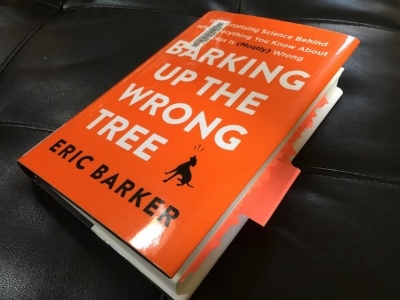What's Your Story?
/It might not be what you think.
When we think of our story, we think of what we tell others. This story usually consists of our background, our expertise in various areas and what we’ve had a chance to experience throughout our lives.
Our résumé is a story, our online dating profile is a story, how we introduce ourselves is a story, even our elevator pitch is a story and it can influence how others view us—how they mentally file us for future reference.
What if I were to tell you that those stories, though important, are not as material as your story, what you tell yourself?
We talk to ourselves. A lot. Our internal dialogue is between 600 and 1,000 words a minute*. Seems overwhelming, right? Don't even try to calculate how many words that is over a month, a year or even the average lifespan. It's mind boggling!
We say words matter but the sheer volume that incessantly streams through our consciousness really brings this home for me.
At the most fundamental level, the story usually goes one of two ways:
- I can or I can’t
- I will or I won’t
- I’m good or I’m bad
- I’m a doer or I’m a quitter
- I fit in or I don’t fit in
- I’m happy or I’m miserable
- I’m lucky or I’m unlucky
I’m fascinated with behavioral science, it’s the science that shows us the unintended consequences being human has on our lives. It turns out that we’re not computers. Computers don’t have emotions but we do. And thoughts trigger them.
You can see this as a flaw or as a strength of the human condition. I choose to see it as a strength because that means we can game the system.
Welcome to The Matrix NEO.
We can infect our own programming to be a more successful version of ourselves by installing a type of benevolent virus.
“For nearly every area of your life, like career or relationships, you have a story you tell yourself about it. But rarely are these consciously or deliberately constructed.”
How? By paying attention to our inner dialogue. That alone can start to change the script.
By paying attention, by hearing what we’re saying to ourselves and evaluating why we’re saying what we’re saying, we can reinforce the good and start to eliminate the bad. Our thoughts are only our reality if we give them that power and observing ourselves helps us take control of that power.
Here are some examples* of positive self hacking:
- It’s irrefutable. Fake it til you make it works. We bring about what we think about and do. Whatever it is that we want to be or do, we need to start acting like it, both in thought and in action.
- We think virtual reality is new. Nope. We’ve been practicing it for millennia. Visualization is a form of faking. Every successful athlete and performer uses the art of visualization to trick their minds and bodies into thinking they’ve been there/done that, into thinking they’ve put more practice in than they have, that they’ve participated in events they’ve never attended in physical form. We can think our way to greater skill and performance!
- Being gritty works too. Grit is nothing magical. It’s the act of breaking down big goals into bite-sized pieces, preferably even turning the completion of goals into somewhat of a game, an engaging challenge. Turning life into a game enables us to do more and be more than we can fathom. That’s how a Navy SEAL survives Hell Week or how a mountain climber reaches the peak: one moment at a time, one mini-challenge at a time.
- Finally, the greatest game changer of all is considering our own mortality. There’s nothing more powerful than to think about how we want to be remembered, how we want to look back on our lives. It can change our “to do” list into a “to be” list. It helps us stay in tune with our “why”, our internal drive to be the person we know deep down we want to evolve toward.
What’s your story, the REAL story you tell yourself? How do you or do you intend to change an unhelpful script or enhance a helpful one?
*Much of the inspiration for these examples and the stats quoted came via the book Barking Up The Wrong Tree by Eric Barker. I highly recommend the book and Barker's blog Bakadesuyo, which you will find permanently listed on my blog roll on the bottom of the right navigation bar.
Image credit/copyright: Stuart Miles / freedigitalphotos.net
This post contains affiliate links to amazon.com. Purchases made via these links help support the F2P blog. It doesn't cost you anything and helps cover ongoing expenses associated with maintaining this blog. Thank you for your support.




